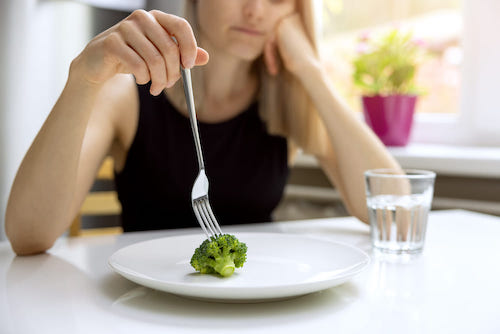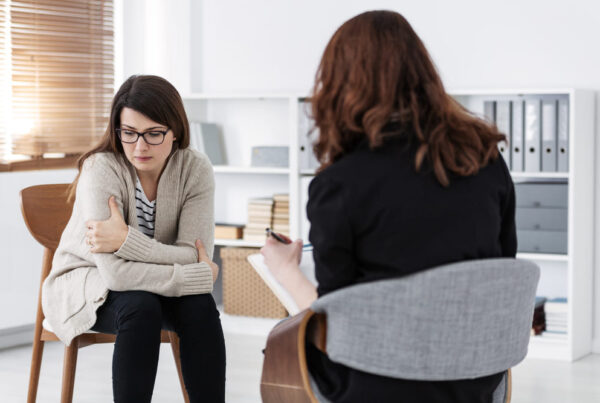In this, the third and final installment of our April blog series on the mental health implications of COVID-19, we’ll look at potential challenges caused by isolation, ways to remain calm when you’re not feeling that way, and strategies for coping with the mental health implications of a COVID-19 diagnosis. Your Local Psychiatrist NYC mental health practitioners, Christine Chollak, NP, and Tessa Zamponis, NP, answered our questions. Please join us in thanking them and all of the other mental health practitioners playing a key role in keeping us safe and healthy during a challenging time.

Q: A big challenge of staying at home is the fact that we’re more isolated from friends, family, and co-workers. What can people do to help deal with feelings of loneliness?
- Again, stick to a routine. This gives you a sense of productivity and limits idle time which is frequently used to fuel anxiety.
- Doing something to distract yourself is important to avoid negative thought ruminating.
- Try to do something meaningful that will give you a sense of purpose.
- Sign up for a class or do something you have been putting off that keeps you engaged and your mind active.
- Stay connected with friends and family. Maybe find unique ways like writing a letter, or joining a virtual chat or support group. There is even a new online tool called QuarantineChat that allows you to talk, at random, to another person who is stuck at home.
- Stay active and keep your body moving. There are many things you can do in your home like an online exercise class or stretching. This helps combat depressive feelings that tend to arise after being inside day after day. Exercise, especially in the morning or early afternoon, can also give you energy and help promote healthy sleep.
- Journaling is a great way to keep track of your thoughts too, which can help you make sense of what you’re feeling.
Q: Lots of experts are telling us to remain calm during this situation, which is often easier said than done. What techniques can people use to help themselves stay calm?
Make sure to distract yourself if you start to feel on edge. Distraction activities can be anything you put your energy into including crafts, reading, exercise, cooking, cleaning, or learning something new. Here are a few other tips we recommend trying:
- Remind yourself that this is a temporary period of isolation to slow the spread of the virus. There are teams of professionals across the world trying to fight this, and you are playing an important role by listening to healthcare recommendations and staying inside.
- Stay connected with friends, family and colleagues via email, social media, video conferencing or telephone.
- Engage in healthy activities that you enjoy and find relaxing. Listen to music, draw or paint, do yoga or meditate regularly, pursue a hobby, read, or write.
- Maintain a regular sleep routine, eat healthy foods, and maintain a balanced diet. Avoid binge-eating and excess alcohol consumption.
- Try to maintain physical activity. Stretch regularly.
- For those working from home, try to achieve a healthy balance by allocating specific work hours, taking regular breaks, and adhering to a consistent schedule. Working from home creates a lack of work/life boundaries, so it is important to create your own parameters for the work day.
- Avoid obsessively watching disturbing news and social media. Put time limits on your daily news consumption. When you are listening or looking up news, make sure you do it in a way that is productive. Don’t listen to alarming reports that do not help you. Instead, make sure you are listening to local guidelines, changes, and recommendations. This will help you use the news to make informed decisions for yourself and feel prepared.
- Do not feel helpless or hopeless about this situation, and do reach out for mental health assistance if needed. It is okay to not be okay at times such as these; but it is essential and necessary to seek professional help or guidance.
Q: Suppose someone is diagnosed with COVID-19. What would you tell them about how to maintain their mental health while they process the diagnosis and deal with the related physical health issues?
Being diagnosed with COVID-19 can induce anxiety and a sense of panic. While this is a serious illness, many who contract it will experience minor symptoms. It is incredibly important to remember this. If an individual develops symptoms, it is key that they treat them as they normally would. For example, if you develop minor symptoms, do not expect that you will need hospitalization. Be patient with yourself during the healing process, and make sure you are getting enough sleep and staying hydrated. Though you will need to take time off from work and your normal routine, still try to keep your mind active when tolerated. This is important as it will prevent you from fixating on your symptoms and creating worst-case scenarios in your head. To ease any anxiety associated with passing the virus to loved ones, try to stay physically isolated from others, but still check in via phone calls regularly. Remember, this is a temporary state. Of course, if your symptoms escalate to the point where medical attention is needed, seek help. However, remember that most people can recover at home without complications.
If you or a loved one are struggling with a mental, emotional, or social challenge, call us today to make an appointment with our therapy team.
CRISIS INFORMATION
Your Local Psychiatrist does not provide crisis services and is not staffed to respond to people in crisis. If you or someone you love are in crisis, below are some resources that may be helpful.
- If you are in danger or are having a health- or mental health-related emergency, please call 911 or go to the nearest emergency room.
- If you are experiencing a crisis, text 741741 from anywhere in the U.S. to reach a trained crisis counselor with the Crisis Text Line.
- If you or someone you love are contemplating suicide, please call the National Suicide Prevention Lifeline at 1-800-273-TALK (8255), En Español 1-888-628-9454, for support.



